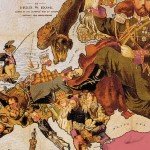
For France before World War I, the 19th century, as elsewhere, was a period of economic modernisation and growing national unity. But but it was also a century of political turmoil, public dissatisfaction and military embarrassment. After the defeat of Napoleon Bonaparate in 1815, France shook off decades of revolution, dictatorship and war. The Bourbon monarchy was restored – a move which did not please everyone, but provided some stability and breathing space for recovery. In 1848 another revolution implemented another republic; Louis-Napoleon, one of Bonaparte’s nephews, returned from exile to be decisively elected as French president. Within four years he had seized autocratic powers, then had them endorsed by a referendum that was most likely rigged. In December 1852 Louis-Napoleon had himself crowned as Emperor Napoleon III, and France yet again had an absolutist monarch.
Napoleon III’s chief interest was the French empire and how to expand it, so he soon began influencing or dictating foreign policy. This often had poor outcomes for the nation and the French people. The emperor’s meddling initiated the Crimean War with Russia in 1853, then a conflict with Austria in 1859. These wars, followed by an economic recession in the 1860s, saw the emperor’s public support plummet. In 1870 Napoleon III was provoked into a risky war with Prussia, which at the time boasted Europe’s most professional military force. It was a disastrous decision: within six months France was defeated and Napoleon had been captured. The French people responded by abolishing the monarchy, the third time they had done so in the previous 80 years. In the subsequent peace negotiations, Paris surrendered to Prussia the provinces of Alsace and Lorraine. The French would agonise over these lost territories for the next four decades. The popular view – that they must one day be reclaimed for France – was a considerable source of anti-German nationalism.
“The twin shocks of defeat at the hands of Prussia and a temporary successful revolution in Paris produced in many of the French people a deep sense of national humiliation. Despite a remarkably swift economic recovery, and the establishment of a new, if unloved political system, French self-respect was not entirely resorted. As a result, France craved recognition of its status as a force to be reckoned with; this affected French attitudes towards all kinds of issues and questions.”
Paul Hayes, historian

The 19th century also saw France’s transition from a nation of peasants to a modern and diverse economy. Industrialisation, which had occurred much later in France than in Britain, was nevertheless well underway by the mid-1800s. Thousands of French farmers left their rural villages and relocated to towns and cities, causing rapid urbanisation and its connected problems. By the 1870s almost one-quarter of French workers were employed in factories and heavy industry. Railway construction was expanded rapidly, furthering internal trade and exports. The late 1800s saw the beginning of what the French call the Belle Epoque, or ‘beautiful era’. France and its people began to enjoy the benefits of industrialisation and modernisation: cheap resources, technological developments, new inventions like the telegraph and automobile, readily available consumer goods. Living standards improved generally, though France was still plagued by class disparity and poverty. The Belle Epoque was accompanied by a cultural boom, with new artistic movements and entertainment forms like cinema, cabaret and the infamous can-can.
As elsewhere in Europe, the working classes were often the last to benefit from industrialisation – if they benefited at all. This led to dissatisfaction, grievances about working conditions and demands for political representation. French workplaces and communities were fertile ground for socialists and other radicals, many of whom enjoyed considerable support. By the early 1900s France had one of the most left-wing governments in Europe: a progressive mix of centrists and socialists. It passed laws guaranteeing freedom of religion and the complete separation of church and state; government funding of churches was abolished and all religious buildings were nationalised. A series of laws decreed free and compulsory education for all French children, both boys and girls. The government also introduced a progressive income tax, with higher rates for higher earners – a radical innovation for its time.

Abroad, the French consolidated their empire and sought to expand it. They competed with Britain for new territories in Africa and strengthened their control of French Indochina (Vietnam, Laos and Cambodia). In early 1913, Raymond Poincare became president of the French republic. Poincare – who was conservative, nationalist and anti-German – was a foreign policy interventionist who was determined to bolster France’s position in Europe. During 1913-14 Poincare made some outspoken criticisms of Germany and the Kaiser. He also conducted negotiations and foreign visits to strengthen France’s existing alliances, drawing it closer to both Russia and Britain.

1. France endured a turbulent first half of the 19th century, divided and disrupted by war, revolution and political instability.
2. In 1870 the French ruler Napoleon III entered into a dangerous war against Prussia, which produced an embarrassing defeat.
3. The loss of significant provinces like Alsace and Lorraine was a source of tension and nationalism for the next 40 years.
4. French industrialisation grew steadily in the later 1800s. New affluence gave rise to a period of urban, cultural and artistic growth called the Belle Epoque.
5. The French rulers were also occupied with the ‘race for empire’ and for securing France’s position in Europe, particularly against a rapidly industrialising and militarising German empire.
© Alpha History 2014. Content on this page may not be republished or distributed without permission. For more information please refer to our Terms of Use.
This page was written by Jennifer Llewellyn, Jim Southey and Steve Thompson. To reference this page, use the following citation:
J. Llewellyn et al, “France before World War I” at Alpha History, https://alphahistory.com/worldwar1/france/, 2014, accessed [date of last access].
